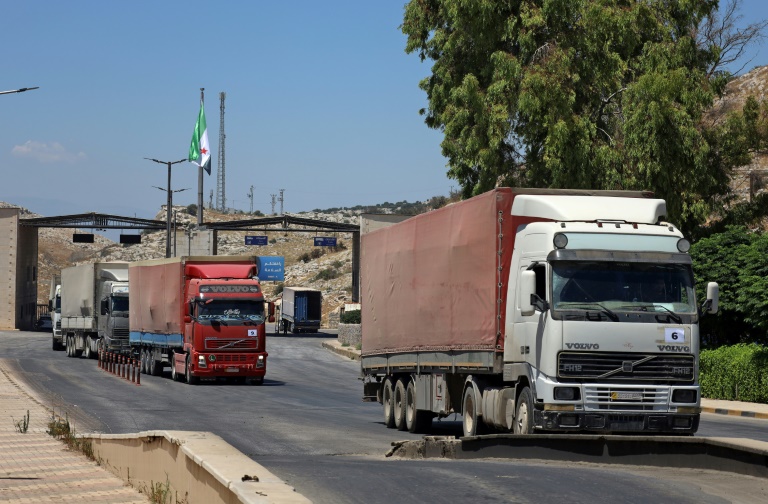Still no UN vote on extending cross-border aid to Syria as deal lapses

A picture taken on July 28, 2022 shows the entry of a United Nations aid convoy through the Bab al-Hawa border crossing with Turkey
United Nations – Negotiations continued at the United Nations Monday as officials scrambled to reach a last-minute agreement on extending vital cross-border aid to millions of people in Syria, according to diplomatic sources.
A vote on the deal’s extension, originally scheduled for 10:00 am (1400 GMT) Monday, “has been postponed to allow for further consultation among Security Council members,” the British UN mission, which heads the council this month, said on Twitter.
The 15-member Security Council does not have a plan for when it will reconvene, according to another diplomatic source, while the existing aid deal expires Monday after having been renewed for six months in January.
The arrangement, which began in 2014, allows the UN to deliver humanitarian aid from Turkey to populations living in rebel-held regions of northwestern Syria without navigating areas controlled by government forces.
The mechanism originally allowed for four entry points, though now only the Bab al-Hawa crossing remains passable, and the accord comes up for renewal every six months due to pressure from Damascus ally Moscow.
Now, the crossing provides more than 80 percent of the needs of people living in rebel-controlled areas — everything from diapers and blankets to chickpeas.
According to several diplomatic sources, the latest resolution — drafted by Switzerland and Brazil — would allow for a one-year renewal, as demanded by humanitarian workers.
But Russia, which in July 2022 vetoed a one-year extension, is again insisting it will only agree to another six-month deal, according to the same sources.
UN humanitarian affairs chief Martin Griffiths last week again called for the opening of more crossing points, for at least 12 months.
The situation “is intolerable for the people of the northwest, and those brave souls who help them to go through these ups and downs every six months,” he said, pointing out that humanitarian agencies have to bring pre-positioned stock into the country every time access is threatened, in case the crossing is closed.
According to the UN, four million people in Syria depend on humanitarian assistance to survive following years of conflict, economic strife and devastating earthquakes.
After the earthquake in February, which killed thousands of people in the country, Syrian President Bashar al-Assad agreed to the opening of two other crossings, though that authorization is set to expire in mid-August.
“I have every hope that they will continue to be renewed. I see no reason why not,” Griffiths said last week, after having met Assad in Damascus at the end of June.
